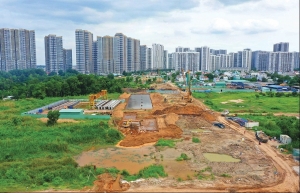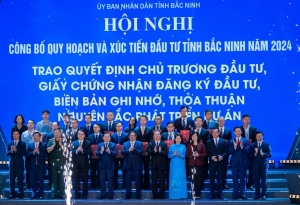Fresh hopes for real estate in 2025
According to Kiet Vo, director of Residential Project Marketing, CBRE Vietnam, 2024 served as a transitional year, bridging the old and new phases of the market. He noted that key legislative changes would play a pivotal role in shaping the industry’s trajectory.
“Together with three important laws – the Land Law, the Housing Law, and the Real Estate Business Law – taking effect from August, it will create a legal corridor and a favourable premise for the next market period. Therefore, 2025 is considered the first year of a new development cycle,” Kiet said.
Kiet predicts that the real estate market will maintain its recovery trend in 2025 at a pace similar to that of 2024. In the northern market, Hanoi is expected to remain at the core of this new cycle, with an anticipated supply of 25,000-30,000 units. In contrast, Ho Chi Minh City’s supply will be more modest, at around 7,000-8,000 units.
Kiet also highlighted that the real estate market in 2025 is likely to develop more stably and sustainably, thanks to supportive factors such as a clearer legal framework and the valuable experience gained by investors through previous market cycles. However, he cautioned that a return to the vibrant golden period of 2018-2019 would require several more years.
Nguyen Quoc Anh, deputy general director of PropertyGuru Vietnam, believed that from the second quarter of 2025, the real estate market will enter a period of prosperity, with property prices expected to rise steadily. He observed that market confidence is improving, driven by increased interest in real estate, better investor sentiment, and a more stable economic environment.
“At present, the real estate market is in a new cycle, with its context shaped by three key factors: credit, interest rates, and policies. New laws set to take effect will act as catalysts for recovery,” Anh said.
He explained that the market’s trajectory would vary across different phases. Until the end of the first quarter of 2025, the market will remain in a consolidation phase, with buyers focusing on actual housing needs. Private houses and townhouses are likely to dominate buyer preferences during this time.
 |
| Fresh hopes for real estate in 2025 |
From the second to the fourth quarter of 2025, the market is expected to experience strong growth, led by high-profit segments such as land plots and project villas. The stable cycle projected for 2026 is expected to see rising prices and liquidity across various property types.
A real estate market outlook report released in November by Vietcap Securities aligns with these forecasts. The report noted that by the third quarter of 2023, Vietnam’s housing market had hit its lowest point and begun a gradual recovery. Hanoi’s apartment segment is projected to lead this recovery.
The report also highlighted an increase in preparatory activities for launching new projects and improving homebuyer confidence. These factors are expected to support growth in primary real estate transactions in 2024 compared to the previous year.
Looking ahead to 2025, Vietcap believes that real housing demand – comprising buyers looking to live in or rent out properties – will remain strong, with mid-range apartment projects being the primary focus. Additionally, investment buyers, particularly those seeking long-term asset accumulation, are anticipated to return to the market, targeting select low-rise housing products.
Homebuyers are expected to favour projects from reputable developers with proven track records in legal transparency, handing over land use and housing rights certificates, and delivering strong after-sales service. Strategic locations with good infrastructure and amenities will also be a significant factor in purchasing decisions.
| Marc Townsend, senior advisor Arcadia Consulting
The new legislation is vital for developers, and it will force them to rethink the way they do business by increasing transparency and raising the barriers to entry for new market entrants. Some smaller developers may actually leave the marketplace. We continue to be optimistic about a recovery in the local residential market for 2025. The combination of this new legislation, the anti-corruption drive, the lowering of the mortgage rate, and a strong economy will encourage many families to start visiting new launches and showrooms again. For various reasons, the housing market has experienced an undersupply of condos and houses in both Hanoi and Ho Chi Minh City over the last 18 months. This has led to extreme pricing volatility. As more developers complete their projects, we think the market will see less volatility and more stability in terms of pricing and supply. However, there are signs of pent-up demand in the mid-market (60-80 sq.m units) as more first-time buyers enter the market. Mortgage rates are more attractive now, and the ‘wait-and-see’ approach that characterised 2024 will begin to fade. In the hospitality sector, there is still an overhang of supply in key coastal areas like Halong Bay, Danang, Nha Trang, Vung Tau, and Phu Quoc, and we don’t foresee much recovery in these locations until airport capacity increases. Over the last two years, Vietnam’s tourism sector has shown good signs of recovery, but hotel room capacity still outstrips demand. The domestic market continues to prove its resilience, and Indian tourists are slowly replacing Chinese visitors. One exception to this is in Hanoi and Ho Chi Minh City, where there has been increased demand for high-end hotels, particularly for business and meetings industry travel. This demand has supported average daily rates and occupancy. We expect this recovery to continue into 2025. Andy Han Suk Jung, CEO, Filmore Real Estate Development
Following the implementation of the three revised laws, the Vietnamese real estate market in 2025 is expected to become more transparent and streamlined. These changes are anticipated to engage increased investment from both local and international sources. With the new laws coming into effect, market confidence is set to rise, leading to increased consumption of real estate products. From the developers’ perspective, more flexible land use policies will make it easier to acquire and utilise land for various projects, resulting in a greater supply of real estate products entering the market. From the buyers’ perspective, enhanced market transparency and investor protection will encourage both domestic and foreign investments, driving up demand for real estate products. Consequently, these changes are likely to stimulate market activity, leading to increased transactions and a more dynamic real estate sector. As we close 2024, we are witnessing the launch of new residential projects with higher selling prices, despite limited supply. This trend is expected to continue into 2025. However, rising construction costs and regulatory compliance may pose challenges for developers, potentially impacting the prices that buyers will have to bear. With more projects being launched and increased supply in the market, we may see some competition, which could result in better offers for buyers. Michael Piro, CEO, Indochina Capital
Vietnam has reached a level of political stability that is regaining the confidence of the global investment community. The economy has been growing rapidly, as the second-fastest in the region and also one of the fastest in the world, driven largely by its manufacturing base, which plays a critically important role as part of the global supply chain. On top of that, we’re finally seeing global interest rates coming down, so I think capital will start to flow a little bit more freely. Next year, I predict that we will see increased foreign direct investment (FDI) into Vietnam. When we look at 2024, by no means has it been a bad year. We’ve seen strong FDI flowing into the country, most of it into the manufacturing sector. However, next year we’ll start to see the capital diversify into other sectors. We’ll start to see service related or hotel related transactions pick up as the tourism market recovers. We’ll also continue to see individual foreign investors carrying out direct investment into residential real estate, as we have seen rapid price growth in this segment. Next year will be a very interesting time for FDI, combined with the resurgence of local real estate developers and investors. This will provide a healthy balance of domestic and foreign capital moving into real estate projects. This leads me to expect for price levels across all sectors will continue to increase. |
 | Rules now clearer for extension of land use New regulations on land use term extension and adjustment under the Land Law 2024 offer significant opportunities for foreign investors. DFDL Vietnam’s partner and co-managing director Hanh Tran, and senior legal advisor Nguyen Bao Ngoc, explain how the rules can provide greater certainty and stability for investments. |
 | Green initiatives are key to growth for industrial real estate Despite forecasts for 2025 to be a year of significant global geopolitical uncertainty, Vietnam remains well-positioned to capitalise on shifting global trade flows and evolving supply chains. |
 | Bac Ninh province shows great potential for industrial real estate Bac Ninh province is a magnet for investment thanks to its geographical advantages, favourable policies, and the implementation of key transportation projects connecting domestic and international economic hubs. |
What the stars mean:
★ Poor ★ ★ Promising ★★★ Good ★★★★ Very good ★★★★★ Exceptional
Related Contents
Latest News
More News
- Construction firms poised for growth on public investment and capital market support (February 11, 2026 | 11:38)
- Mitsubishi acquires Thuan An 1 residential development from PDR (February 09, 2026 | 08:00)
- Frasers Property and GELEX Infrastructure propose new joint venture (February 07, 2026 | 15:00)
- Sun Group led consortium selected as investor for new urban area (February 06, 2026 | 15:20)
- Vietnam breaks into Top 10 countries and regions for LEED outside the US (February 05, 2026 | 17:56)
- Fairmont opens first Vietnam property in Hanoi (February 04, 2026 | 16:09)
- Real estate investment trusts pivotal for long-term success (February 02, 2026 | 11:09)
- Dong Nai experiences shifting expectations and new industrial cycle (January 28, 2026 | 09:00)
- An Phat 5 Industrial Park targets ESG-driven investors in Hai Phong (January 26, 2026 | 08:30)
- Decree opens incentives for green urban development (January 24, 2026 | 11:18)




 Tag:
Tag:





















 Mobile Version
Mobile Version